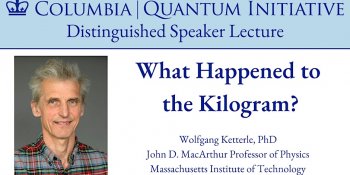CQI Distinguished Speaker Lecture: Wolfgang Ketterle

Abstract: For 130 years, a cylinder made of a platinum-iridium alloy stored near Paris was the official definition of a kilogram, the basic unit of mass. This all changed on May 20, 2019. A kilogram is now defined by a fundamental constant of nature known as the Planck constant (h), which relates the energy of a photon to its frequency: h= 6.62607015 10-34 kilograms times square meters per second. The definition of the kilogram is now connected to the definition of time, realized by atom clocks, and the speed of light. Sounds complicated? In this talk, Ketterle will provide the reasons for changing the definition of the kilogram, give simple explanations of what the new kilogram is conceptually, and explain how objects with exactly known masses can be realized using precision measurements and advanced quantum technology.
Speaker Biography: Wolfgang Ketterle has been the John D. MacArthur professor of physics at MIT since 1998. He received a diploma (equivalent to a master’s degree) from the Technical University of Munich (1982), and a Ph.D. in physics from the University of Munich (1986). He did postdoctoral work at the Max-Planck Institute for Quantum Optics in Garching and at the University of Heidelberg in molecular spectroscopy and combustion diagnostics.
In 1990, he came to MIT as a postdoc and joined the physics faculty in 1993. Since 2006, he has been the Director of the Center of Ultracold Atoms, an NSF-funded research center, and Associate Director of the Research Laboratory of Electronics. His research group studies the properties of ultracold quantum matter.
For his observation of Bose-Einstein condensation in a gas in 1995, he received the Nobel Prize in Physics in 2001. Other honors include the Gustav-Hertz Prize of the German Physical Society (1997), the Rabi Prize of the American Physical Society (1997), the Fritz London Prize in Low-Temperature Physics (1999), the Benjamin Franklin Medal in Physics (2000), and a Humboldt research award (2009).
This is an in-person event that is open to the public with RSVP.
About the Columbia Quantum Initiative:
In the first half of the 20th century, the first quantum revolution gave us a new way of thinking about the way the world works and brought us technologies such as lasers, MRI machines, and the transistors that underpin all aspects of modern life. Today, the second quantum revolution is underway, and it’s all about control.
The coming generation of quantum technologies will be built on new physical principles and demand new materials, new methods of investigation, and new collaborations. At Columbia, we’re tackling these demands together and training the next generation of quantum scientists and entrepreneurs.
Building on the collaborative culture long fostered at Columbia, the Quantum Initiative is combining interdisciplinary expertise in materials science, photonics, quantum theory, and more, all while taking advantage of our unique position in the global hub that is New York to develop novel quantum technologies that will open new frontiers into how we compute through complex problems, communicate with one another, and sense the world around us.
Learn more at the site
Subscribe to the CQI newsletter
Time: 12:00-13:00 PM EDT
Free!
